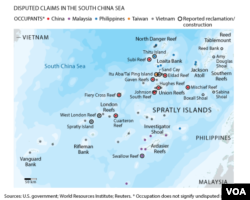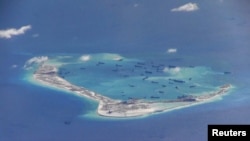As an international arbitration ruling draws near on the Philippines' case against China’s claim to almost the entire South China Sea, Manila is relying on international support to bolster its cause.
When the Group of Seven (G-7) nations, without naming China, officially expressed concern Monday over activities that it said raised tensions in the South and East China Seas, the Philippines welcomed the move, saying it “once again upholds the principles of international law.”
It also highlighted the G-7’s stated support for the use of legal dispute settlement mechanisms such as arbitration.
Philippine Ambassador to the United States Jose Cuisia said the statement gave a boost to Manila’s arbitration case against Beijing.
'Abide by decision'
“It is important for us precisely for the international community to keep saying that they would like to see the parties, both parties, abide by the decision of the arbitral tribunal,” Cuisia said.
But China took exception to the statement and on Wednesday Beijing announced it had summoned top diplomats from the G-7 member states and “solemnly clarified” its stance.
The Philippines filed a case with the International Tribunal for the Law of the Sea in 2013 questioning what it called China’s “excessive claims” to practically the entire sea. It also sought clarification on whether certain disputed outcroppings in the sea were rocks or islands.
China opted out of arbitration when it signed onto the U.N. Convention on the Law of the Sea and said it rejects the case, which Philippine officials expect will be decided in weeks, if not the coming month.
In the past two years, China has turned seven outcroppings, most of which are listed in the Philippine case, into artificial islands.
Some of these islands have docks and airstrips capable of supporting military craft.
'Militarization' of disputed waters
A growing number of nations, led by the United States, have become more vocal about alleged “militarization” of the disputed waters, which are heavily traversed and rich in natural resources.
Emphasizing this vocal global support of the Philippines’ call for upholding “the rule of law” has been a tactic of the island nation, whose military budget is minuscule compared to China.
During an academic talk at Philippine military headquarters last month, Philippine Supreme Court Justice and South China Sea historian Antonio Carpio pointed out recent statements of support from the 10-member Association of Southeast Asian Nations (ASEAN), along with the United States at in a recent summit in California.
“We’ve been trying to convince our friends abroad to support us in the arbitration case and the European Union declared a few days ago – the EU, through it’s high representative, called on all parties to abide by the legally binding ruling of the tribunal. This is the mantra that we want the world to say,” Carpio said.
Analysts have said they expect the five-member panel to render a partial decision in favor of the Philippines. Although the decision is binding, there is no international enforcement mechanism.
International support
Gregory Poling, director of the Asia Maritime Transparency Initiative at the Washington-based Center of Strategic and International Studies, said the growing international support will have an impact on China.
“When you add reputational damage to China, when you name and shame, of course… it does not have an immediate effect upon Chinese behavior necessarily but it does undermine China’s long term interests,” Poling said. “Other nations do not want to work with you if you’re seen as a bad player in the international system.”
Maritime law professor Jay Batongbacal of the University of the Philippines Institute of International Law Studies said having other countries’ backing is an effective way to put pressure on China. But no one should expect China to suddenly start changing its statements and do an about face.
“At minimum we hope that its subsequent behavior will be moderated because it will have some kind of standard to contend with as far as law and the international community is concerned, with respect to what actions it can legitimately take in pursuit of its claim,” he said.
But analysts said such changes in behavior could take years, if not decades.






